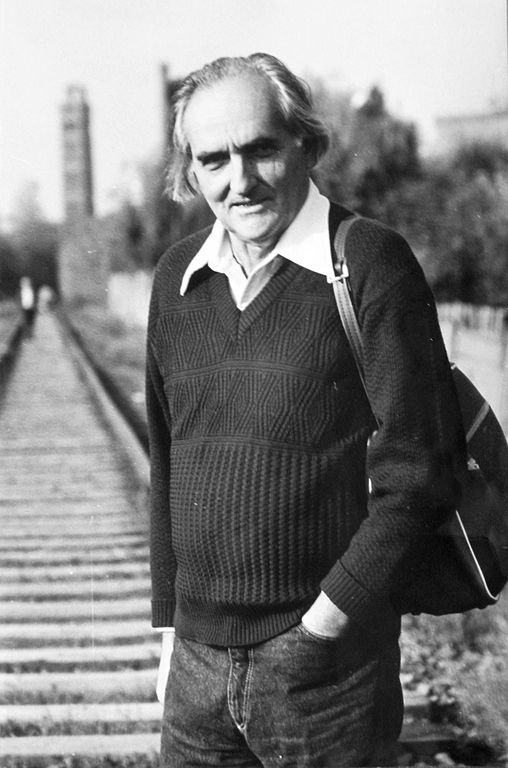Nash Holos: Yaroslav Dashkevych
 Yaroslav Dashkevych was a prominent Ukrainian historian, and one of the founding members of the Scientific Center of Judaica and Jewish art.
Yaroslav Dashkevych was a prominent Ukrainian historian, and one of the founding members of the Scientific Center of Judaica and Jewish art.
In a time of rapid devaluation of national values (which is how we can characterize the latest decade of our history), Dashkevych was a significant role model for thousands of people. He was a living example of intellectual and professional honesty, and a real patriot of Ukraine.
Even after a lengthy exile in Siberia, he did not give up his beliefs. He remained professional and dedicated to culture. His school of historiography, hundreds of works, articles, and essays will acquire a proper appreciation among future generations.
Yaroslav Dashkevych was a Doctor of History, Director of the Lviv branch of the Hrushevskyi Institute of Ukrainian Archeography and Historiography, and head of the historical-philosophical division of the Shevchenko Scientific Society.
He was born on 13 December 1926 in Lviv to Olena and Roman Dashkevych. Yaroslav’s mother was Olena Stepaniv, the first Ukrainian woman officer and a cornet of the Sich Sharpshooters – Sichovi Striltsi.
His father, Roman Dashkevych, was a general in the Ukrainian National Republic Army.
After studying Ukrainian Language and Literature at the Lviv National University, he worked as a librarian. In December 1949, he was arrested by the KGB as politically unreliable, and sentenced to 10 years imprisonment.
Following his release, with the stigma hanging over him of being politically suspect, he was unable to find work. His forced unemployment was to last 23 years. It was during that period that Yaroslav Dashkevych became a world-renowned expert on Ukrainian studies, a specialist on the history of the East, in particular, Armenia and the author of academic works on history, archeography and source studies.
Most of his works were published abroad. These are works on the history of Ukrainian-Armenian and Ukrainian-Jewish relations, conceptual articles on Ukrainian history, bibliography and cultural studies of the 20th Century. He is the author of Lviv Armenian-Kipchak Documents of the 17th and 18th Centuries; Armenian Colonies in Ukraine in Literary Sources of the 15th to 19th Centuries; Ukraine Yesterday and Today; Ukraine and Armenia.
During his long academic career, he wrote more than 900 works on Ukrainian historiography, source studies and special historical disciplines, Eastern Studies, Ukrainian-Armenian, Ukrainian-Turkish, and Ukrainian-Jewish relations. On 25 February 2010, at the age of 84, the renowned scholar passed away. This outstanding Ukrainian historian was buried at the Lychakiv Cemetery, near his mother’s grave.
Dashkevych once wrote: “In Ukraine, along with short periods of hard times, there were longer periods of Jews and Ukrainians living side-by-side. A unique Jewish culture sprang up here, and it needs to be preserved. The interconnectedness of cultures requires a thorough research and dissemination.”
Together we lived through the darkness and cruelty of the Soviet and Nazi tortures, the destruction of priceless human life and our common spiritual wealth. In Galicia, there was a lot of good in the relations between Ukrainians, Poles and Jews. There was also a lot of evil, which was artificially sown and cultivated by third-party political forces.
At the Jewish Heritage Museum, it is our goal to follow the vision of Yaroslav Dashkevich … and to restore and renew the historic affection and affinity that, unhindered, developed organically and naturally between the Ukrainian and Jewish people. We believe that the healing that comes from restoring this bond will benefit not only Ukrainians and Jews, but all of humanity.
Narrated by Renata Hanynets
Faina Petryakova Scientific Centre for Judaica and Jewish Arts
Jewish Heritage Museum Lviv, Ukraine
Listen to the program here.
Ukrainian Jewish Heritage is brought to you by the Ukrainian Jewish Encounter (UJE), a privately funded multinational organization whose goal is to promote mutual understanding between Ukrainians and Jews. Transcripts and audio files of this and earlier broadcasts of Ukrainian Jewish Heritage are available at the UJE website and the Nash Holos website.



















